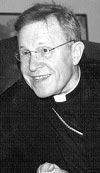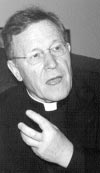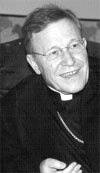 |
 |
|||||
 |
 |
 |
 |
 |
|||||||||||
 |
 |
 |
|||||||||
| Cardinal Walter Kasper: “If we stop with dialogue, then all is lost, and we should speak about the problems rather than be silent about them.” Catholic New World photos/Sandy Bertog
Sowing the seeds of peace through dialogue
Cardinal Walter Kasper, president of the Pontifical Council for Promoting Christian Unity and the Vatican’s Commission for Religious Relations with the Jews, accepted the 2002 Distinguished Service Award at Catholic Theological Union’s annual “Blessed Are the Peacemakers” dinner April 17. The Catholic New World: The award you’re receiving is for your efforts to bring peace between churches and religions. But a lot of the violence that we’ve seen in the last year, especially in the Middle East, seems to have a religious component to it. How can we turn that around and make religion a force for peace? Cardinal Walter Kasper: There are many efforts to make religion a cause for peace because the three religions which are in play in the Middle East—the Jews, the Christians and the Muslims—they believe all in the same God. Peace, shalom, salaam is a key term in all three religions and there are religious leaders on all three sides trying to come to peace. I don’t think that the religious questions are the real cause of the whole conflict—the political conflict, economic conflict. There is a conflict of interest, and they make misuse of religion, I think, because to use religion to legitimize violence is a misuse of religion. It is an offense to human dignity and it is an offense to God. I think that the central statement of the Day of Prayer Jan. 24 at Assisi that all religions said that to justify violence by religion, by the name of God, is a misuse of religion. This is the main point. A second point would be that war and peace have their sources in the hearts of human beings. Here is the source of hatred, or love, or forgiveness—they start in the human heart. Only God can reach, can touch, can transform the human heart. Therefore prayer for peace is one of the most powerful weapons religious people have to make peace. At some point, peace is not possible without justice. Peace is not only silence of arms. Peace supposes justice for both, and justice is not possible without forgiveness—mutual forgiveness. We have all of us a past, especially between Jews and Christians, but we are not chained to our past. What will come can build up a new future by forgiveness. TCNW: How does the fighting in the Middle East complicate the interreligious relationships between Jews, Christians and Muslims? CWK: Of course, there is compassionate empathy of Christians and Christians in the Holy Land. This complicates of course in significant ways dialogue between us, but I think even in this complicated and fragile situation, dialogue must go on. If we stop with dialogue, then all is lost, and we should speak about the problems rather than be silent about them. We are trying now to establish a dialogue between Jews and Christians in Israel itself. Up to now we had no official dialogue in the Holy Land itself, so that is a good step forward. TCNW: I want to bring the conversation home to Chicago. Chicago is a very diverse city. How do we Christians understand the claim of the uniqueness of Christianity in such a diverse religious environment? CWK: The uniqueness of Jesus Christ cannot be separated from his universality. As Christians, especially as Catholic Christians, we see the seeds of the truth of Jesus Christ in all other religions. Therefore, there is a common heritage between all religious people. This common heritage had a reality beyond what you can touch, what you can translate, what you can do. This common heritage comes out of a common conviction of the sanctity of life. This is common to all religious people. We have a lot in common, and we as Christians are encouraged to see the seed of truth which we believe is revealed in its fullness in the life of Jesus Christ. Therefore we can meet with other people not only with tolerance—tolerance is too little—but with respect, respect for all that is good, that is true, that is spiritual in other religions. We can also be enriched by dialogue with other religions. … Jesus Christ came as a high authority, but he came at the same time as a servant. Love is the ultimate reality for a Christian. Therefore, if we are living according to the model Jesus Christ gave us means to be a servant to other people, to give them room, not to dominate them or impose our faith. We have to witness to our faith, but to give room to other people. We can try to convince them, but in a very respectful way. Since Vatican II, there has been a lot done. I remember my childhood, when I was a young boy, these Lutherans, we would say, they are strange people. And now we have brotherhood, we have friendship, between Lutherans and Catholics. Also many things changed between Jews and Christians since the Council, and all these old prejudices we tried to overcome. There are now many friendships between Jews and Christians going on, a new partnership, a new solidarity between all believers. TCNW: Do you see a difference between ecumenism in the United States and Europe? CWK: Yes. In Europe, there is a very heavy historical burden, and that makes it more difficult. Here, there is a younger history, and people came here from Europe to find freedom, and freedom of religion. You never had a state religion here. So there is a different history, and you have not the burden of history we have in Europe. This makes it easier. The (U.S.) is a much more pluralistic country than we have in Europe, although Europe becomes more pluralistic now. There are people from different nations here—you have Polish, you have Germans, you have Irish, you have Hispanics, you have people from Asia—it’s a whole tradition of living together in respectful and civilized ways. This makes a difference in ecumenism. Perhaps also a little more pragmatic; Germans are also a little too principled, perhaps. This also facilitates conversations. I am very astonished, surprised, but also very happy about what I experience here in ecumenical relations. TCNW: What do you see as the most important ecumenical issue right now? CWK: The most important was and is and will be to come to an agreement about the center of the Gospel. And this I think we’ve reached, more or less. In the main, we are witnessing for the same God, we have the same belief in Jesus Christ, who is the savior of all men and women, we have justification, which is what Jesus Christ needs from me, a part of Christology. So we have reached a high level of agreement. But now we come to the question of what is a church? A church is a sign, an instrument of the Gospel and there are still different visions of church between churches and communities. A certain point—I think it’s a new one, and a very difficult one—there are growing differences in ethical questions: about abortion, about homosexuality, about bioethics, these kinds of problems. This bothers me a lot, because these are obstacles to common action, to common witness in this world, in this situation. There are different positions now and we have to struggle a lot to overcome these differences. They are new questions. Since the partition, (other churches) were very much of the same opinion, but there are growing differences. We must work on and face this new problem, because they can very easily become dividing, not on the high theological level, but on the practical, everyday level. TCNW: In the first part of that answer, you were talking different visions of church. The Catholic Church has recently had difficulty with the Russian Orthodox Church. How can that be resolved? CWK: We must look a little bit at the history. There is a very strong tradition in Russia of anti-West, anti-Western culture, and to emphasize the values of the Russian culture. It’s only 12 years now since the Russian Orthodox Church is free. It’s now faced with a totally changed and shifted world. Then came czarism; they were not free under the czar. Then came the whole Communist oppression and persecution, and they were not free. And now, a changed world. It needs time to find its orientation in this strange world. Only one problem: religious freedom. Although we Catholics, we took a long time to recognize religious freedom, we did it in Vatican II. For the Orthodox, it’s still a problem. As long as they do not come to grips with this problem, it’s difficult for them to have a place and give witness in our world today because religious freedom is a fundamental human right for us. They need time, and we must be patient with them. With the Orthodox, we are very close dogmatically. We have the same church structure, with episcopacy and apostolic succession, the sacraments, all the spiritual richness—we have a lot to learn from them—the difference is not so much dogmatic, although there is the dogmatic difference on the primacy of the pope. The difference is one of mentality and of culture. Rome, Byzantine—this happened in the first millennium. They never had Enlightenment. All our Western societies went through Enlightenment—and their churches. They never had that. Often, dialogue with Protestants is easier even though we are much more separated in dogmatic matters, because we have the same mentality, we have the same methods in theology. Now comes this new problem that the Vatican created four new dioceses. For us, this was a merely administrative affair. Apostolic administration—nobody knows what is apostolic administration. Diocese, everybody knows. In time, all should be dioceses. But it is only a word. Nothing has changed; they have the same persons, the same bishops, the same territories. They misunderstood it very much, now they are saying Russia became a province of Rome. There are ecclesiastical provinces in the United States, but the United States is not a province of the Vatican. There are dioceses all over the world. There are Russian dioceses here, and it’s not their canonical territory. But it is good, because there are Russian Orthodox here, and they need to take care of them. But there are also Catholics in Russia—a tiny minority, but we need to take care of them. We do not want to make out of Russia a Catholic country. That was absurd. They have their own tradition, a very rich tradition, and we want to cooperate and to help them. Proselytism is not our strategy. They have all that is necessary for salvation.
Front Page | Digest | Cardinal | Interview |
|||||||||||